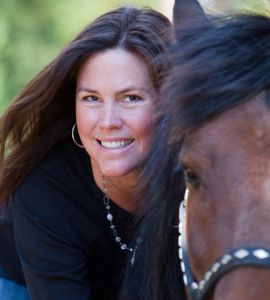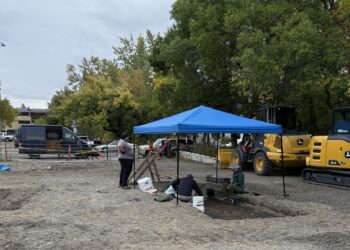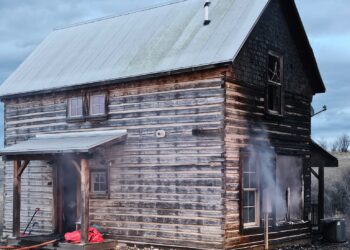By Abbie Digel, Explorebigsky.com Editor
Laura Munson created a firestorm from her farmhouse outside of Whitefish in 2009 with her brutal but true piece in the New York Times’ Modern Love column. One year later, she published This is Not the Story You Think It Is: A Season of Unlikely Happiness, a memoir that pulled at the heartstrings of readers worldwide.
A city girl who moved to Montana 19 years ago with her husband, Munson’s book is now published in nine countries. She is published regularly in magazines, and blogs for the Huffington Post, as well as at her own blog, These Here Hills. Munson shares an editor with Kathryn Stockett, author of The Help and her book is a New York Times bestseller.
The Weekly recently chatted with Ms. Munson about life, land, and the human condition, but mostly about the state we share and love.
AD: As a writer, how do you stay motivated, especially in this beautiful country with so much to offer?
LM: The currency is different here. It’s all about the work, and you hope that someday, somehow you get paid for it.
After my book was published, I started hosting writing retreats, teaching writing workshops in Montana and internationally. In September, I’m hosting one in Whitefish. The workshops also include equine therapy, yoga, and exercises to help people get out of their own way on the page. If a writer is more honest on the page, they are more honest in life and I want to help inspire that kind of writing and living.
For me, working here has shifted the paradigm of the tortured writer. Montana calls us out into it—to not just sit holed up in our writing rooms, but to be physical and get outside. That is such an important way to balance the introspective writing life.
AD: How has life changed since you’ve been published?
LM: If I hadn’t spent so many years writing, I might have had a minor meltdown. Now suddenly I have this bestseller, and thank god it happened when it did. I know who I am as a woman and as a writer. I am a prose architect. I trust myself, and a lot of that has to do with Montana.
Now things have finally steadied with speaking engagements and writing gigs. I’m able to get back to what I know, but if I hadn’t built a strong writing practice I would be staring at the ceiling in shock. It’s all about getting back to work with authenticity and integrity. I even turned down Oprah because, as much as I love her great work, the theme of the show didn’t feel right for the message of my book. If I had stayed in the city, I don’t know…would I have been more tempted to be on her show?
AD: Does your previous life growing up the in posh suburbs of Chicago stay with you? How have you changed, and have you gotten used to such a different lifestyle?
LM: I grew up in a place where the homes, architecture, towns, and institutions were well- established. I write a lot about those institutions and the “safety” they promise. You soon begin to realize that pain is everywhere. But pain is only relative to the person who is feeling it. While those institutions and privilege might make you feel like there is security, they can’t protect you from emotional pain, illness and loss.
Montana has taught me a lot about what really matters; it is a great equalizer. Living here is all about accountability. You can’t live in a climate-controlled life where back and forth you go, not knowing what the weather is like. That’s what keeps me here. The land is a powerful teacher.
Also, my kids are comfortable in their own skin, and Montana has everything to do with that. If you’ve got that foundation, and are grounded in the natural world, you can take that anywhere.
Here, I’m not worried about getting mugged on the subway. I’m humbled, being a member of the food chain. I’m more worried about my icy driveway than grizzly bears and mountain lions. I think that the education you get roaming around in the wild is more important than any other education you can get.
AD: What other Montana artists have you connected with?
LM: I knew very little about Montana before I lived here. My husband and I moved from Seattle, where there was a lot of writing support. Because it’s a city, there were lots of artists inventing their lives. Moving here was a shock.
I’ve always had a total obsession with Jim Harrison. When I read Dalva, that’s when I knew I was writer. I related profoundly with how Harrison stitches it all together—the poetry—the hard edges—the land. It’s because of Montana that I am proud to call Jim a friend now. His poetry serves as bookends to my memoir. What an honor.
I read all of the Montana writers, and really respect them—sometimes to the point of putting them on a pedestal, and in the early years, sometimes to the point of minor stalking– driving around hoping to see them in person. Once I was sitting at the Chatham Bar and Grill in Livingston and there was Russell Chatham—I was star struck. I said to the server, “I’ll have what he’s having.” It was a glass of Domaine Tempier Rosé. It’s now my favorite glass of wine because of that day. Montana is full of surprises!
I also quickly learned about the writing community in Missoula. The University of Montana MFA creative writing program is highly renowned, and after years of reading the writers from down there and hearing them speak, it was so full circle to present at the Festival of the Book last year. Montana has turned out to be an incredible community of writers for me.
AD: What other western writers do you admire?
LM: When I moved here, I wanted to understand the West. I started reading masculine writers like Wallace Stegner, Cormac McCarthy, David James Duncan and Rick Bass who have become dear friends, Sherman Alexie, Doug Peacock, James Welch, Richard Ford…
AD: Any females?
LM: So many of them are men, and I’d like that to change. Pam Houston was the first person in my generation that I know of to move from a city and write about the West from a woman’s point of view, and hit the mainstream. She writes in a language that people living in urban and suburban zones can relate with. But there are many other women writing about the West—Mary Clearman Blew, Maile Meloy, Glen Chamberlain who teaches at Bozeman, Dee McNamer, and of course Terry Tempest Wiliams who is one of my mentors.
AD: Tell me how you got noticed, then published, while you were out in Montana.
LM: I published a memoir, but I am a novelist at heart, and I didn’t have a platform. I often wondered if I missed the boat by moving to Montana. Sometimes I feel there is a party out there where all the movers and shakers of the publishing industry are invited, and I’m out here walking in the woods with my dogs missing all those opportunities for networking. But the truth is, success and failure are both illusions. It’s about doing the work, and there’s no better way for me to do that than inside my house in Montana. Moving to Montana doesn’t mean that you’ve moved to Siberia culturally. Whatever kind of artist you are, it’s a great place to truly find your voice. Montana has called me out of my head and into my body. I would never take back my years here. I was a city girl, and now home is inside me no matter what the future brings in the way of geography. What greater lesson is there than that? I have Montana to thank for it.
AD: What do you love most about your lifestyle?
LM: I love how we live by the seasons. In summer we are so active, hiking in Glacier National Park and swimming in the pristine lakes around here. But during winters here, the land goes dormant, and that’s when I work best. Sometimes my kids complain about there not being enough to do here. But I remind them that if they were in the suburbs in Chicago, they would be saying the same thing. I ask them: Do you know how many kids would die to live in a ski town? And they smile knowing that they have it pretty darn good!
AD: In your book, you talk about your work to help prevent a subdivision from going up. Do you still do extracurricular work?
LM: There are very few places like Montana left. Living here, there’s a certain responsibility to be accountable for the land and to me that means helping to preserve wandering rights and open spaces for all of us, animal and human. I try to do my part, but the best work I do is on the page.
AD: What do you like to write about?
LM: I like to write about the stuff people do to each other. I’m less interested in plot and more interested in my characters and how they think and feel. I like having land as a character in my books and I like the woman’s perspective of how land works in you. It would be interesting to gather a panel of western women writers and talk about the influence of land in their books.
AD: I like drawing connections between Big Sky and other small resort communities in Montana. Can you tell me more about Whitefish?
LM: Whitefish is still figuring itself out. My father used to come here in the ‘40s because he was in the railroad business. When I moved here, he asked if Whitefish had morphed into a ski town. But 19 years ago when I came there were still trappers, renegades… in many ways it is still sort of the same way. Plenty of people here have never skied down a mountain. There are ranchers, and there’s a logging community. And there are also plenty of people who have moved here with deep pockets. All of us are living here together in a very Us/Us way. I love it for its diversity this way.
I am particularly proud of our new Whitefish Trail which has 100 miles of non-motorized trails where we ride horses, mountain bikes, cross country ski. This has been a huge endeavor, and it helps inform the future of development, because it’s not going to end. We just have to help inspire people to be responsible about it.
In the past, Whitefish hasn’t really been a destination ski resort, but that’s changing. We get less than 75 days of sunshine per year and there’s a lot of fog on the Big Mountain. When I travel and say I’m from Montana, people usually refer to Bozeman and Big Sky as the place on their radar. This area is definitely changing, but I still think of it as the underdog in the way of development, and while we need the economical boost…I admit that I’ve liked that.














